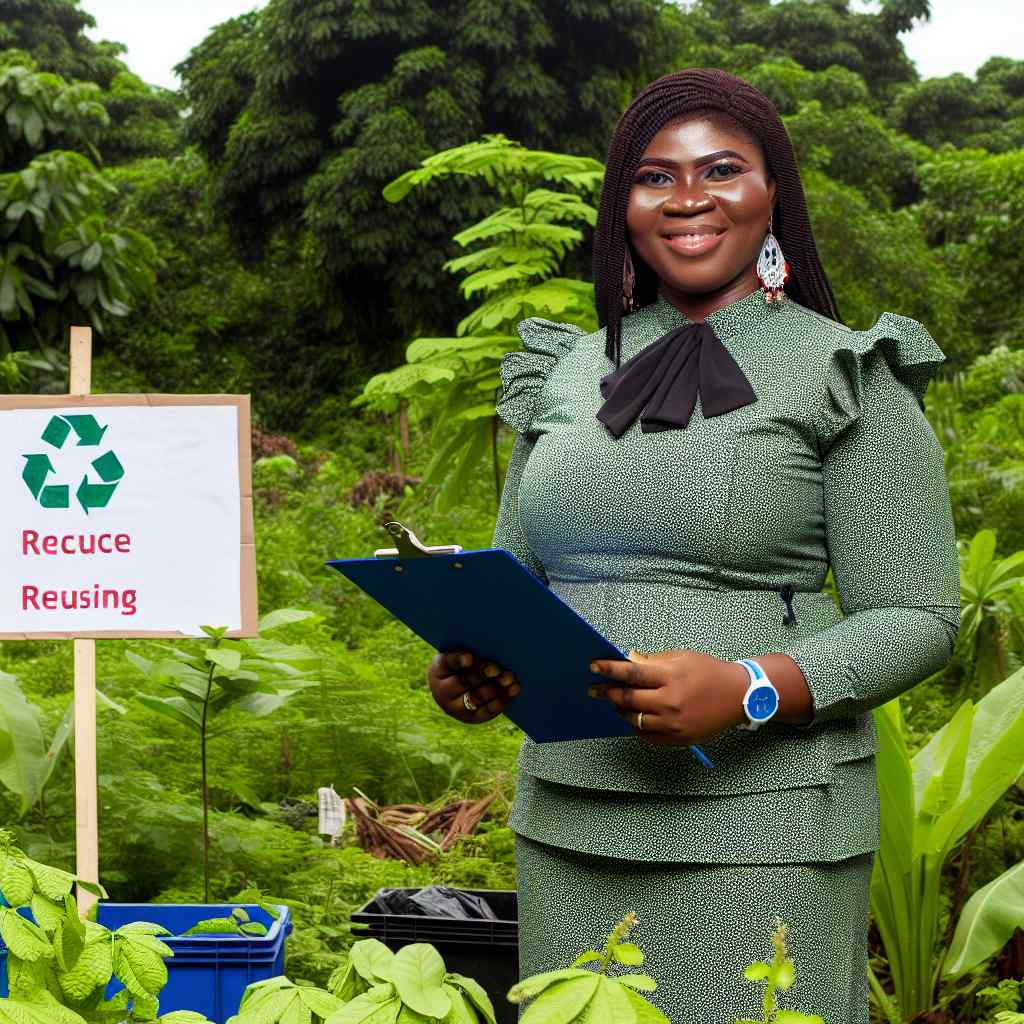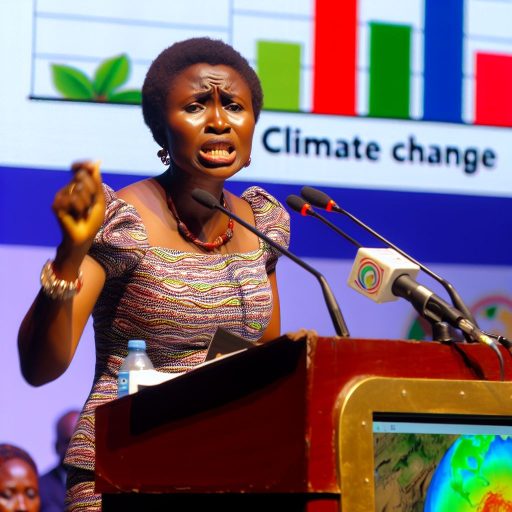In Nigeria, women play a crucial role in environmental management.
They contribute significantly to conservation and sustainability efforts.
Their involvement is essential for addressing environmental challenges in the country.
This blog post will explore the key roles that women play in environmental management in Nigeria.
Importance of Women’s Involvement
Women’s participation in environmental management is vital for promoting sustainable practices.
They ensure the well-being of communities through their contributions.
Their unique perspectives and experiences bring valuable insights to decision-making processes.
Key Points Covered
- Women’s role in natural resource management and biodiversity conservation.
- Women’s contributions to climate change mitigation and adaptation strategies.
- Challenges faced by women in environmental management and possible solutions.
Historical background of women’s role in environmental management in Nigeria
In traditional Nigerian society, women have played crucial roles in environmental stewardship.
Women were responsible for tasks such as collecting water, firewood, and tending to agricultural lands.
These activities were essential for the sustenance of their families and communities.
Women’s intimate connection to nature and their daily interactions with the environment gave them a unique understanding of conservation.
Traditional roles of women in Nigeria related to environmental stewardship
Nigerian women have historically been responsible for maintaining the cleanliness and orderliness of their households and surroundings.
They often engage in activities such as composting, waste management, and reforestation efforts within their communities.
Women have also been involved in traditional practices like herbal medicine and sustainable farming methods.
Cultural customs or practices that impact women’s involvement in environmental management
Some cultural customs restrict women from participating in decision-making processes related to environmental issues.
Male-dominated leadership structures in traditional communities may limit women’s opportunities to influence environmental policies.
Traditional beliefs about gender roles can also discourage women from taking on leadership roles in environmental conservation projects.
However, in recent years, there has been a shift towards empowering women to actively participate in environmental management initiatives.
Challenges Faced by Women in Environmental Management in Nigeria
Women in Nigeria face several challenges when it comes to actively participating in environmental management and protection initiatives.
These challenges hinder their full potential in contributing to sustainable development and addressing environmental issues.
Societal Norms
- Traditional gender roles in Nigerian society often limit the involvement of women in environmental management.
- Cultural practices and beliefs may discourage women from taking on leadership roles in environmental initiatives.
- Women are sometimes not taken seriously in male-dominated spaces where environmental decisions are made.
Lack of Education
- Many women in Nigeria have limited access to quality education, which hinders their understanding of environmental issues.
- Without proper education and training, women may lack the necessary skills to actively engage in environmental management projects.
- Education is key to empowering women to become effective environmental stewards and advocates.
Limited Access to Resources
- Women often have limited access to financial resources and funding opportunities for environmental projects.
- Lack of access to technology and information also puts women at a disadvantage in implementing sustainable environmental practices.
- Existing power structures and inequalities may prevent women from accessing resources needed for environmental management.
Gain More Insights: Role of NGOs in Nigeria’s Environmental Management Efforts
Success stories of women leaders in environmental conservation in Nigeria
- Dr. Amina J. Mohammed: Former Minister of Environment
- Achievements: Spearheaded environmental policies and initiatives
- Impact: Improved waste management, sustainable development
Dr. Amina J. Mohammed’s Story
Dr. Amina J. Mohammed is a renowned Nigerian environmentalist and diplomat who served as the Minister of Environment in Nigeria.
She played a pivotal role in crafting and implementing various environmental policies and initiatives that have had a significant impact on the country’s sustainable development.
- Waste Management: Dr. Mohammed championed efforts to improve waste management practices in Nigeria, leading to cleaner and healthier environments in many communities.
- She pushed for the adoption of sustainable waste management practices and encouraged recycling and proper disposal methods.
- Sustainable Development: In addition to waste management, Dr. Mohammed focused on promoting sustainable development practices across the country.
- She spearheaded initiatives to protect natural resources, conserve biodiversity, and promote eco-friendly practices in industries and communities.
Chief (Mrs.) Margaret E. Icheen: Founder of the Women’s Initiative for Sustainable Environment (WISE)
Chief (Mrs.) Margaret E. Icheen is a pioneering environmentalist and the founder of the Women’s Initiative for Sustainable Environment (WISE), a non-profit organization dedicated to promoting environmental awareness and conservation in Nigeria.
- Community Impact: Through WISE, Chief Icheen has empowered women and communities to take action on environmental issues, such as deforestation, pollution, and climate change.
- She has organized tree planting campaigns, clean-up drives, and educational programs to raise awareness about environmental conservation.
- Environmental Advocacy: Chief Icheen has been a vocal advocate for sustainable environmental practices and policies.
- She has worked with government agencies, NGOs, and local communities to address environmental challenges and promote sustainable living.
- Her advocacy efforts have led to positive changes in environmental policies and practices at both local and national levels.
Dr. Gloria Elemo: Director-General of the Federal Institute of Industrial Research, Oshodi (FIIRO)
Dr. Gloria Elemo is a distinguished scientist and the Director-General of the Federal Institute of Industrial Research, Oshodi (FIIRO), a leading research institution in Nigeria.
She has made significant contributions to environmental management through her research and innovation initiatives.
- Research Innovation: Under Dr. Elemo’s leadership, FIIRO has developed innovative solutions for environmental challenges, such as pollution control, waste management, and renewable energy.
- Her research projects have led to the creation of eco-friendly technologies and products that have benefited industries and communities across Nigeria.
- Collaborative Partnerships: Dr. Elemo has fostered partnerships with local and international organizations to address environmental issues and promote sustainable development.
- She has collaborated with research institutes, universities, and government agencies to implement eco-friendly practices and promote green technologies in various sectors.
- Her collaborative efforts have helped to enhance environmental management practices and create a more sustainable future for Nigeria.
These women leaders have made significant contributions to environmental management in Nigeria through their dedication, advocacy, and innovative approaches.
Their success stories serve as inspirations for future generations of environmentalists and conservationists, highlighting the importance of women’s leadership in protecting the environment and promoting sustainable development.
Delve into the Subject: Environmental Impact Assessment: How This Discipline Protects Nigeria’s Ecosystems
Women as Key Players in Sustainable Agriculture
Women in Nigeria play a crucial role in promoting sustainable farming practices.
They ensure food security and preserve biodiversity.
- Women are actively engaged in farming activities, both at the subsistence and commercial levels.
- They are involved in crop cultivation, livestock rearing, and agroforestry practices.
- Women contribute significantly to the production of staple crops such as cassava, yam, maize, and vegetables.
- They also play a vital role in the conservation of traditional seeds and crop varieties, preserving biodiversity.
Empowering Women for Effective Conservation Efforts
Empowering women in agriculture and conservation efforts is essential for sustainable development.
It enhances environmental management.
- When women are empowered, they are better able to adopt sustainable farming techniques that protect the environment.
- Empowered women can make informed decisions about natural resource management, leading to better conservation outcomes.
- Women’s active involvement in agribusiness and biodiversity conservation contributes to rural livelihoods and economic development.
- Providing women with access to resources, training, and support enhances their capacity to promote sustainable practices.
Challenges Faced by Women in Sustainable Agriculture
Despite their critical role, women in Nigeria encounter various challenges.
These challenges hinder their full participation in sustainable agriculture and biodiversity conservation.
- Gender disparities in access to land, credit, inputs, and extension services limit women’s productivity in farming.
- Social norms and cultural barriers often restrict women’s decision-making authority and control over resources.
- Unfavorable policies and inadequate infrastructure impede women’s access to markets and value chains, affecting their income.
- Climate change and environmental degradation pose additional threats to women farmers, exacerbating their vulnerability.
Strategies for Promoting Women’s Role in Agriculture and Conservation
To overcome these challenges, several strategies can be implemented.
- Enacting policies that guarantee women’s land rights and ensure equal access to resources and services.
- Providing training and capacity-building programs to enhance women’s knowledge and skills in sustainable farming practices.
- Supporting women’s participation in agricultural cooperatives and producer groups to strengthen their market linkages.
- Promoting gender-responsive research and extension services that address the specific needs and priorities of women farmers.
Find Out More: Challenges in Implementing Environmental Policies in Nigeria

Women-led initiatives for environmental sustainability in Nigeria
Women play a crucial role in environmental management in Nigeria.
Many lead initiatives focused on sustainability.
- Greenhill Recycling
- Women Environmental Programme (WEP)
- Waste to Wealth Initiative
Greenhill Recycling is a women-led organization focused on recycling and waste management.
Transform Your Career with Expert Guidance
Get personalized mentorship consulting that’s tailored to your unique path. Our expert advice is actionable and exclusive.
Get StartedThis organization contributes to a cleaner environment.
The Women Environmental Programme (WEP) empowers women in rural communities.
This project encourages participation in environmental sustainability efforts.
The Waste to Wealth Initiative is helmed by women entrepreneurs.
This initiative transforms waste into useful products and reduces pollution.
Impact of women-led initiatives on local communities and ecosystems
- Empowerment of women
- Community involvement
- Ecosystem preservation
These initiatives empower women by providing opportunities for leadership.
They promote participation in sustainable practices.
Women-led projects engage local communities in environmental protection.
This fosters a sense of responsibility among residents.
By promoting sustainable practices, women-led initiatives help preserve ecosystems.
They also promote biodiversity in local environments.
Women-led initiatives for environmental sustainability significantly impact local communities.
These projects contribute to a cleaner and greener future for all.
Uncover the Details: Environmental Safety Certifications in Nigeria
Strategies to empower women in environmental management in Nigeria
Empowering women in environmental management is crucial for sustainable development in Nigeria.
Here are some strategies to support and enhance women’s participation in conservation efforts:
Providing education and training
- Offering workshops and seminars on environmental conservation to educate women about the importance of protecting natural resources.
- Providing training programs on sustainable practices to equip women with the necessary skills to contribute effectively.
- Encouraging women to pursue higher education in environmental studies to increase their expertise in the field.
Ensuring access to resources
- Creating opportunities for women to access financial resources to implement eco-friendly projects in their communities.
- Establishing networks and partnerships to connect women with experts, funding agencies, and sustainable technology providers.
- Providing women with access to tools, equipment, and technologies that facilitate their involvement in environmental management activities.
Promoting leadership and representation
- Encouraging women to take on leadership roles in environmental organizations and community-based initiatives.
- Advocating for gender equality in decision-making processes related to environmental policies and projects.
- Creating mentorship programs to support women in advancing their careers in environmental management.
Addressing cultural and social barriers
- Raising awareness about the importance of gender equality and women’s rights in the context of environmental protection.
- Engaging with local communities to challenge stereotypes and traditional norms that restrict women’s participation in environmental activities.
- Providing safe and inclusive spaces for women to voice their opinions and contribute ideas to conservation efforts.
By implementing these strategies, Nigeria can empower women to play a more active role in environmental management, leading to more sustainable and equitable outcomes for all.
Women’s Role in Environmental Management in Nigeria
Women play a critical role in environmental management in Nigeria.
They actively participate in various initiatives and projects.
Through their involvement in conservation efforts, women contribute significantly to sustainable development in the country.
It is important to recognize and appreciate the valuable contributions that women make to environmental sustainability.
Their unique perspectives and experiences enrich the decision-making processes.
This leads to more comprehensive and effective solutions to environmental challenges.
Therefore, it is vital to support and empower women in their efforts to protect the environment.
Promoting sustainable practices will help achieve this goal.
By acknowledging the role of women in environmental management, we can create a more inclusive society.
This society prioritizes the well-being of both people and the planet.
Additional Resources
GENDER ISSUES AND ENVIRONMENTAL MANAGEMENT IN …
Inclusive Environmental Decision-making in a Developing Nation …




